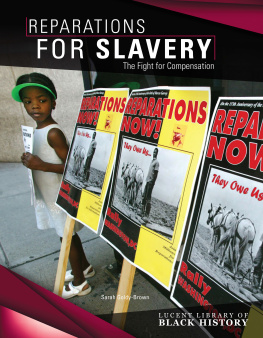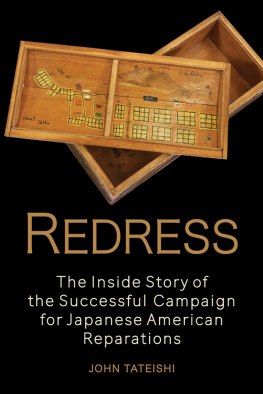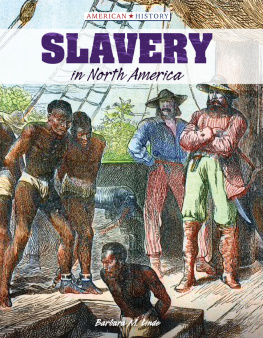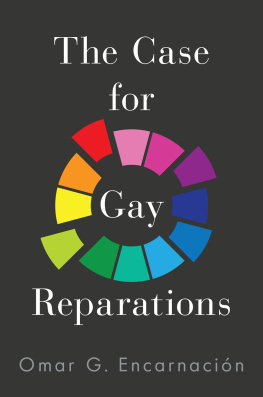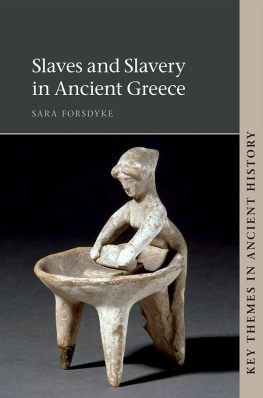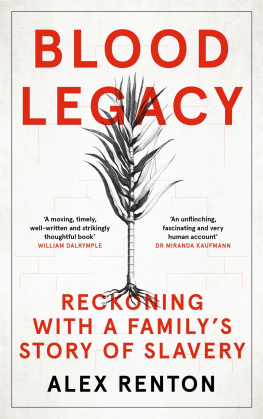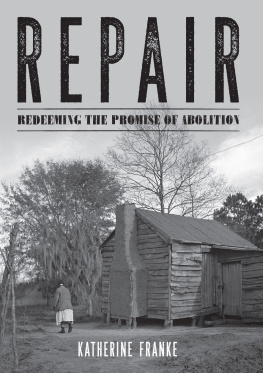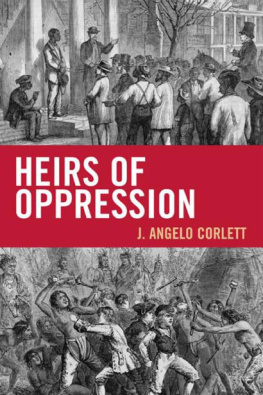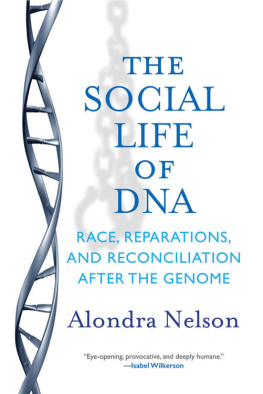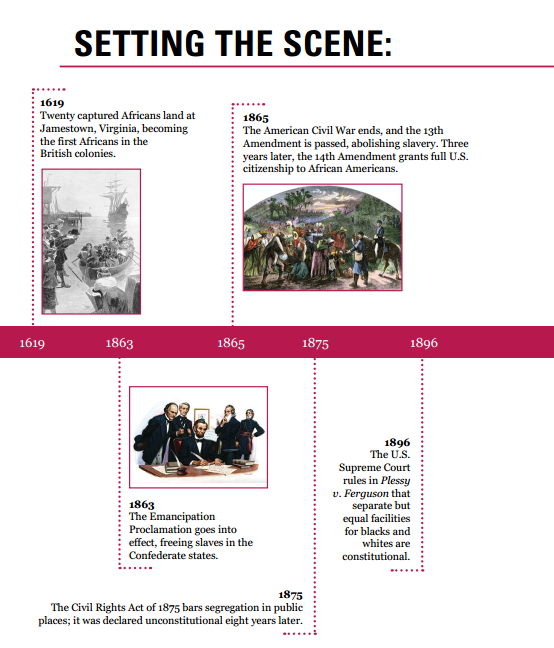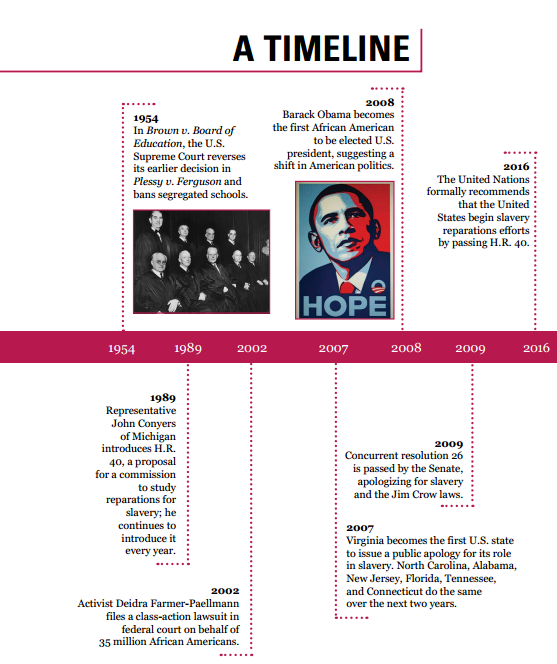Published in 2018 by
Lucent Press, an Imprint of Greenhaven Publishing, LLC
353 3rd Avenue Suite 255
New York, NY 10010
Copyright 2018 Greenhaven Press, a part of Gale, Cengage Learning
Gale and Greenhaven Press are registered trademarks used herein under license.
All new materials copyright 2018 Lucent Press, an Imprint of Greenhaven Publishing, LLC.
All rights reserved. No part of this book may be reproduced in any form without permission in writing from the publisher, except by a reviewer.
Designer: Deanna Paternostro Editor: Jessica Moore
Library of Congress Cataloging-in-Publication Data
Names: Goldy-Brown, Sarah, author.
Title: Reparations for slavery : the fight for compensation / Sarah Goldy-Brown.
Description: New York : Lucent Press, 2018. | Series: Lucent library of Black history | Includes bibliographical references and index.
Identifiers: LCCN 2017049212| ISBN 9781534562332 (library bound book) | ISBN 9781534562974 (pbk. book) | ISBN 9781534562349 (ebook)
Subjects: LCSH: African Americans-Reparations. | Slavery-United States-History.
Classification: LCC E185.89.R45 G65 2018 | DDC 306.3/620973-dc23 LC record available at https://lccn.loc.gov/2017049212
Printed in the United States of America
CPSIA compliance information: Batch #CW18KL: For further information contact Greenhaven Publishing LLC, New York, New York at 1-844-317-7404.
Please visit our website, www.greenhavenpublishing.com . For a free color catalog of all our high-quality books, call toll free 1-844-317-7404 or fax 1-844-317-7405.
CONTENTS
Foreword
Setting the Scene: A Timeline
Introduction:
Slaverys Effect on America
Chapter One
Defining Slavery Reparations
Chapter Two
First Attempts at Reparations
Chapter Three
Reparations from the 1960s to Today
Chapter Four
The Reality of Reparations
Chapter Five
The Controversy Over Reparations
FOREWORD
B lack men and women in the United States have become successful in every field, but they have faced incredible challenges while striving for that success. They have overcome racial barriers, violent prejudice, and hostility on every side, all while continuing to advance technology, literature, the arts, and much more.
From medicine and law to sports and literature, African Americans have come to excel in every industry. However, the story of African Americans has often been one of prejudice and persecution. More than 300 years ago, Africans were taken in chains from their home and enslaved to work for the earliest American settlers. They suffered for more than two centuries under the brutal oppression of their owners, until the outbreak of the American Civil War in 1861. After the dust settled four years later and thousands of Americansboth black and whitehad died in combat, slavery in the United States had been legally abolished. By the turn of the 20th century, with the help of the 13th, 14th, and 15th Amendments to the U.S. Constitution, African American men had finally won significant battles for the basic rights of citizenship. Then, with the passage of the groundbreaking Civil Rights Act of 1964, many people of all races began to believe that America was finally ready to start moving toward a more equal future.
These triumphs of human equality were achieved with help from brave social activists such as Frederick Douglass, Martin Luther King Jr., and Maya Angelou. They all experienced racial prejudice in their lifetimes and fought by writing, speaking, and peacefully acting against it. By exposing the suffering of the black community, they brought the United States together to try and remedy centuries worth of wrongdoing. Today, it is important to learn about the history of African Americans and their experiences in modern America in order to work toward healing the divide that still exists in the United States. This series aims to give readers a deeper appreciation for and understanding of a part of the American story that is often left untold.
Even before the legal emancipation of slaves, black culture was thriving despite many attempts to suppress it. From the 1600s to the 1800s, slaves developed their own cultural perspective. From music, to language, to art, slaves began cultivating an identity that was completely unique. Soon after these slaves were granted citizenship and were integrated into American society, African American culture burst into the mainstream. New generations of authors, scholars, painters, and singers were born, and they spread an appreciation for black culture across America and the entire world. Studying the contributions of these talented individuals fosters a sense of optimism. Despite the cruel treatment and racist attitudes they faced, these men and women never gave up, changing the world with their determination and unique voice. Discovering the triumphs and tragedies of the oppressed allows readers to gain a clearer picture of American history and American cultural identity.
Here to help young readers with this discovery, this series offers a glimpse into the lives and accomplishments of some of the most important and influential African Americans across historical time periods. Titles examine primary source documents and quotes from contemporary thinkers and observers to provide a full and nuanced learning experience for readers. With thoroughly researched text, unique sidebars, and a carefully selected bibliography for further research, this series is an invaluable resource for young scholars. Moreover, it does not shy away from reconciling the brutality of the past with a sense of hopefulness for the future. This series provides critical tools for understanding more about how black history is a vital part of American history.
INTRODUCTION
SLAVERY'S EFFECT ON AMERICA
F rom the time of its founding, the United States has struggled with race relations. Poor race relations between black and white Americans began because slavery based on race was legal in parts of the United States until 1865. During the period of legal slavery, black Americans were seen in many places as inferior to white Americans and had no legal rights whatsoever. It has been more than 150 years since slavery was abolished and more than 50 years since segregation based on race was outlawed in the United States, but the long history of slavery and racial discrimination in America continues to affect the everyday lives of both black and white Americans.
Despite their success, former President Barack Obama and former First Lady Michelle Obama are not immune to racism, as some might suggest. Both recalled situations where others mistook them for the help or valets simply because of their skin color. As president, Obama faced animosity for factors outside of his control. During his presidential campaign and throughout his presidency, many Americans questioned his citizenship status and demanded proof that he was born in the United States. Some felt he came across as a foreigner because his father was a black Kenyan and his mother a white American. This issue arose solely because of his ethnicity and race.

